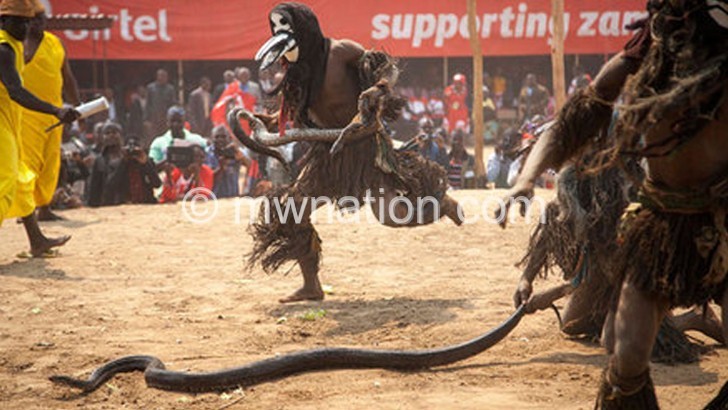Are cultural fests unifying?
Normally, cultural festivals are supposed to foster unity.
Renowned writer and spoken word artist Q Malawezi could not have said it any better in his piece Wikipedia.

Unity is what we need to strive for despite our differences/
Differences are where our strengths lie in but if not embraced, divide/
Perhaps this is not the time to explore the divid-and-conquer strategy used to gain and maintain power line in the same poem.
However, since culture is about people, no cultural festival can happen without people.
This is where the poet comes in again:
The people, referring to masses, whose power lies in the numbers/
Numbers count, people don’t, except for those who count votes/
Depending on where one stands, the statement may have varying connotations. But in terms of cultural carnivals, masses spice them. Huge attendances make the festivals not only colourful, but memorable as well.
Fortunately, huge numbers have been a common feature in the cultural festivals held in the country this year. From the Ngoni’s Umhlangano and Umtheto, Gonapamuhanya of the Tumbuka, Kulamba of the Chewa, Mulhako wa Alhomwe to the relatively new Mdauku wa a Tonga, the patronage was superb.
The Yao will have a taste of this in their maiden Chiwanja cha a Yao, scheduled for this month in Mangochi.
But, do cultural festivals really foster unity? Is there any need for fostering unity in the first place?
A case in point is this year’s Mulhako wa Alhomwe, held on October 21 at Chonde in Mulanje.
The huge turn up, the free beers, plenty of food and, of course, a wide variety of colourful dances from the various dialects making up the Lhomwe tribe.
Signs of unity were abound, too.
The presence of several top dignitaries including former president Bakili Muluzi, Chewa King Kalonga Gawa Undi from Zambia, Inkosi ya Makosi Gomani V and traditional leaders from Mozambique, spoke volumes of how powerfully culture can shape a ‘society without walls.’
But unity is more than coming together. The harmony, irrespective of differences, has to be manifested even in the way individuals conduct themselves. Words and how they come out, matter too.
In his address, Mulhakho wa Alhomwe board of trustees chairperson Leston Mulli fluffed his lines in fostering this unity.
But his conduct went against what the commemorations tried to preach under the theme Culture, a tool for promoting unity. Possibly he could have done better with a reminder from Q’s poem Speak:
To speak is a calling that first calls us all to listen/
But listening is not waiting for someone else to finish speaking/
It is an art that many are called to/
But few answer and even fewer master/
Having initially managed to suppress the urge to boast about his family business’s contribution to sustain the festival that president Bingu wa Mutharika started 11 years ago, the real Mulli finally showed up.
He forgot his own counsel earlier about the gathering being apolitical.
Mulli said: “This is no political gathering but I have one clear message for those going against APM: you are not winning any seat within the Lhomwe belt, not when I am chairing this gathering.
“I mean, what those rebels did was impudence and it has no place in our culture as Lhomwes. They lack manners and honestly, I would not expect them to be castigating the President in public like they do at various podiums. We will not sit back and watch. The least we will do is to ensure they lose their seats come May next year.”
Early this year, some Democratic Progressive Party (DPP) leaders dumped the party to form the United Transformation Movement that is promoting the presidential candidacy of Vice-President Saulos Chilima.
They include former Cabinet minister Patricia Kaliati, former DPP director of youth Lewis Ngalande and Noel Masangwi, a former member of the DPP national governing council.
Kaliati, who missed the function, labeled Mulli’s sentiments as regrettable and contradictory to the theme of the cultural festival.
“I expected something better from the event that normally ought to bring out the best in a tribe. I can only see contradictions mirrored in all his malicious speech. My constituents will speak for themselves come the polling day,” said the Mulanje West legislator.
Mulli’s supposedly veiled message was loud and clear. There is a thin line between the cultural grouping led by President Peter Mutharika as its patron, and the ruling DPP.
Memories are still fresh on how political meddling almost threw out of balance the Gonapamuhanya ceremony in Rumphi.
At Umhlangano in Ntcheu, party colours were banned altogether. Those who tried to defy the order met their match as they were barred from attending.
Even the corporate world becomes willing partners when there is little political interference at such cultural fests.
Which is why organisers of the Chiwanja cha a Yao have some work to do ahead of the launch this month. Their initial attempts to launch the group failed due to political interference, among others.
“We are one of the largest groups, but we lack that kind of coordination,” admitted the group’s spokesperson MacDonald Sembereka.
But they have to cast their eyes beyond the political spectrum. There is the religion card to mind as well.
Most Yao chiefs are Muslims; it will be a mistake to overlook the other faith in running the grouping.
Malawi Cultural Heritage Association interim coordinator Mathews Mfune also advised the association to engage all the Yaos in other parts of the country.
“It is important if they are to have their cultural values preserved. But they need to officially launch a group so that they can work as one, under one leadership,” he said.





